Urban Health Equity Pathway
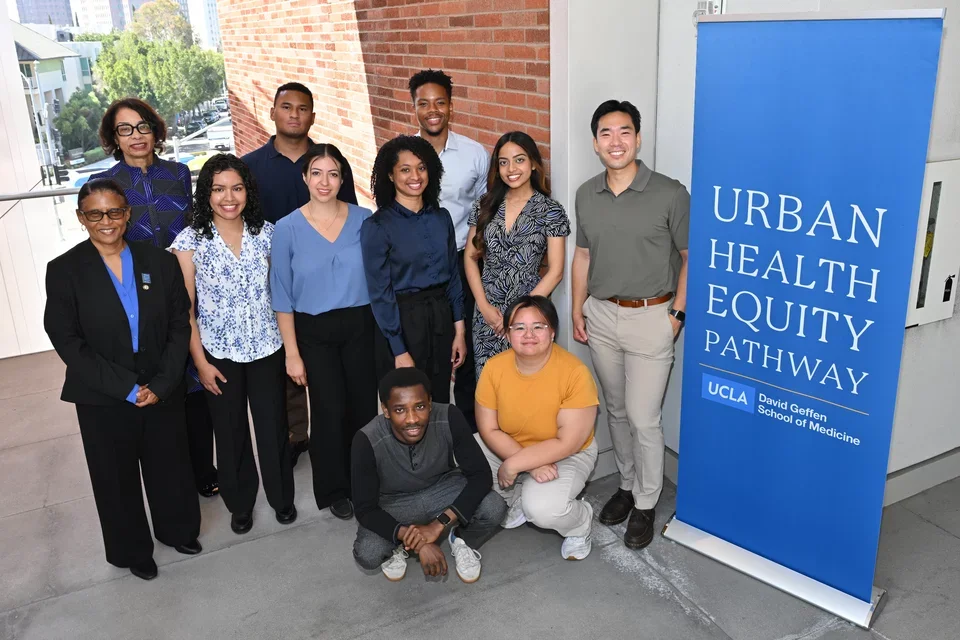
Preparing the next generation of physicians with advanced skills to become compassionate healthcare providers, advocates, and effective community partners, working collaboratively in urban areas with historically marginalized and other disinvested communities
What is the Urban Health Equity Pathway?
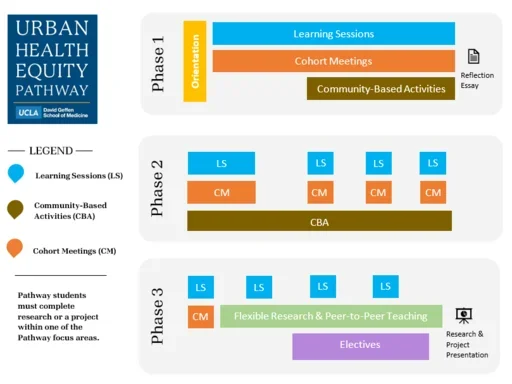
The Urban Health Equity Pathway is a multifaceted program that explores the complexities of healthcare in urban settings. It is designed for future physicians dedicated to advancing health equity and addressing health disparities through interdisciplinary learning in areas such as urban health policy, advocacy, and the built environment. Each year, a select group of students is admitted through a competitive application process.
The Urban Health Equity Pathway is developed around the following themes:
The Pathway empowers students to become changemakers in urban communities. Through the established Pathway themes, students gain insight and skills to help shape the future of healthy populations and cities.
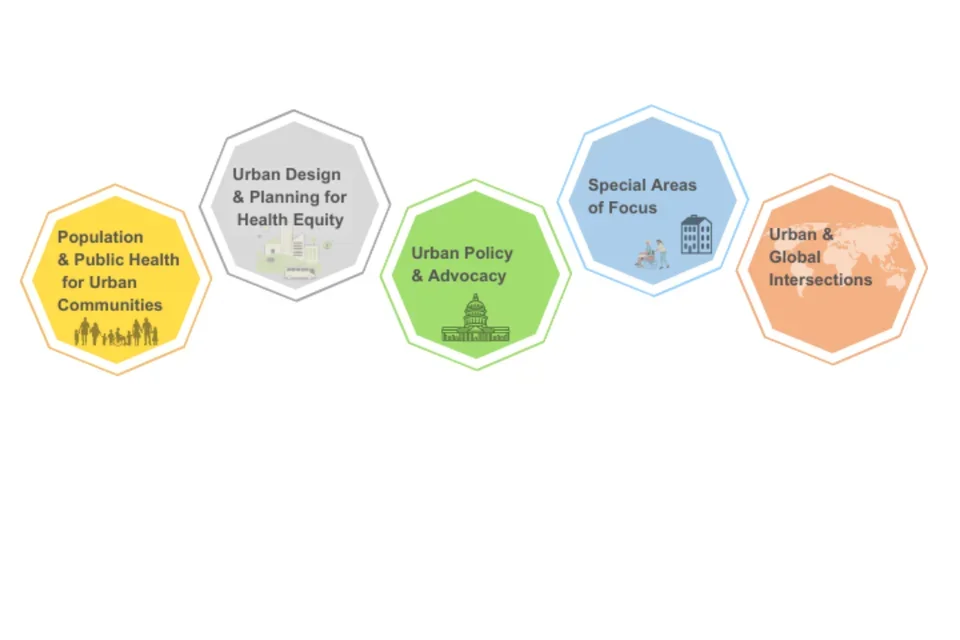
The Pathway engages students in the following experiences throughout their medical school experience:
- Community Engagement– Learners interact with community-based organizations in Los Angeles. Pathway students will be placed at dedicated community-based sites in the first year of medical school as part of the Foundations of Clinical Experience course. This real-world experience is facilitated by DGSOM and community partners and is designed to provide students with an early experience of health care in urban under-resourced areas.
- Expert-led Instruction: Learners interact with faculty, researchers, community leaders, and other professionals from community-based and professional organizations to receive a well-rounded education in core concepts of urban health equity. Instruction is delivered in various formats, including: learning series, dialogues with experts, guest speakers, literature reviews with content experts, and community-based learning.
- Research – A period for scholarly research with dedicated Pathway advisors. Pathway students will have access to all Discovery research offerings. In addition, Pathway students will complete a capstone project within one of the Pathway focus areas. Students may also opt to enroll in one of the six dual degrees offered.
- Electives – Advanced clinical electives will be available for Pathway students in the fourth year of medical school. The program will also be working on expanding clerkship opportunities in urban settings.
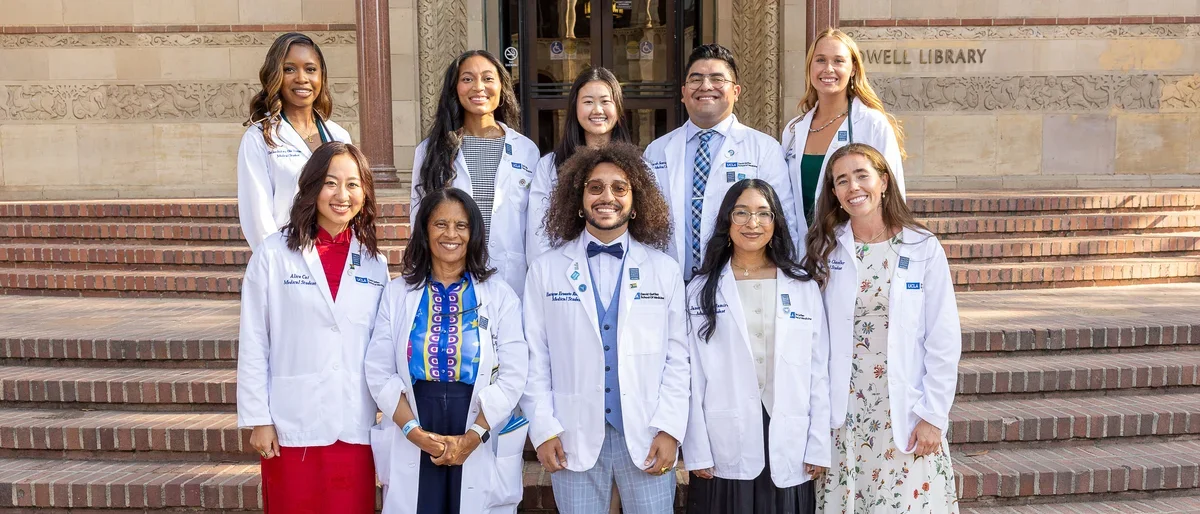
Student Experience
The Urban Health Equity Pathway accepts a small cohort each year (8-12) to create cohesiveness among cohort members.
The Pathway program is designed to complement the traditional medical school curriculum. Programming is intentionally structured to be meaningful, ensuring students can fully engage without compromising their core academic responsibilities.
In addition to the learning and experiential activities, the Pathway cohort meets monthly in the first phase of the curriculum to discuss student experiences and engage with program faculty and staff.
Pathway Partners offers purposeful pairing with senior cohort members. The program is designed to create mentorships between cohort members and across cohort years.
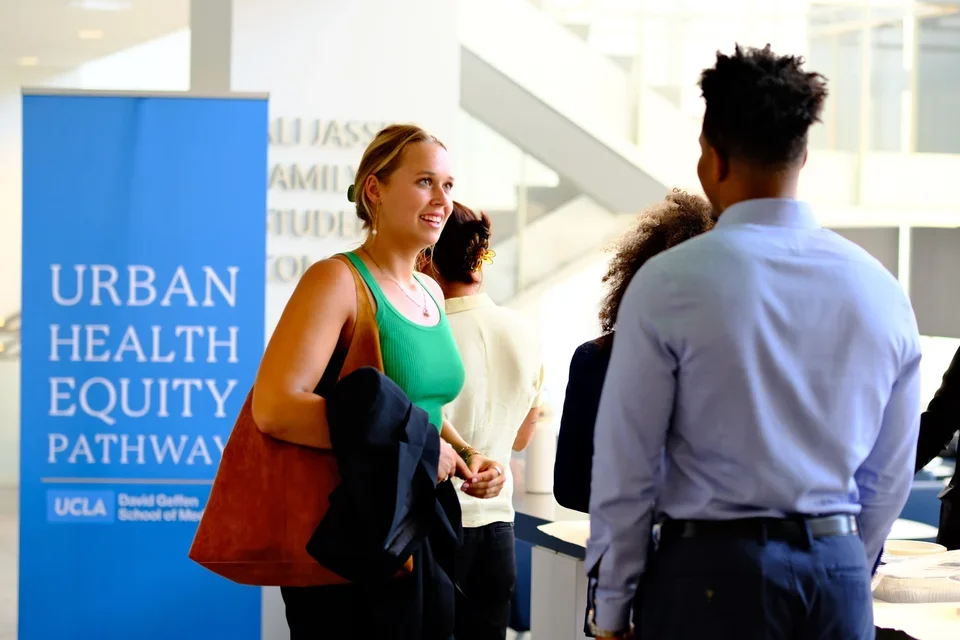
Requirements of the Pathway
- Pathway students must meet all the requirements of the DGSOM MD program, in addition students must complete required pathway educational and clinical experiences and engage in community-based activities.
- Community Service is the first activity associated with the Urban Health Equity Pathway. Learners typically complete their service by the end first year of medical school. The service is comprised of real-life experiential learning as well as self-reflection and facilitated conversations with faculty.
- Discovery/Research preparation begins as early as the first year of medical school. Learners explore the areas of research, engage with faculty mentors, and select a research project or community-based research experience for their Discovery year. Learners complete the required number of research hours and a capstone project.
- Future learners may opt to complete a Master’s degree offered at UCLA.
- Complete pathway-specific elective courses.
Application Process
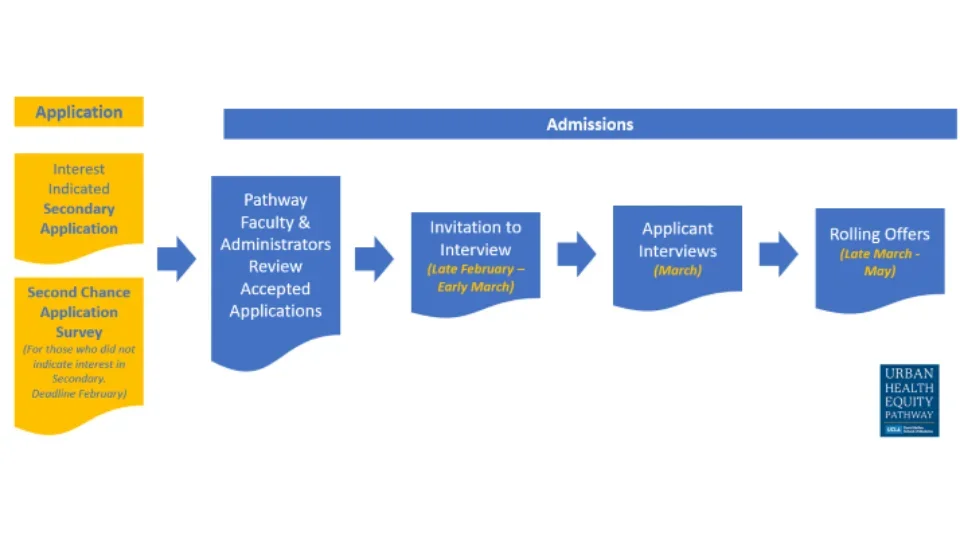
Applications for the Urban Health Equity Pathway are included in the general DGSOM application and submitted concurrently. Late applications will be considered on a case-by-case basis. If you have questions, please contact the DGSOM Admissions Office: somadmiss@mednet.ucla.edu.
FAQs
What is the Urban Health Equity Pathway?
Launched in 2024, the Urban Health Equity Pathway (UHEP) is a curricular enrichment program, designed to provide knowledge, exposure, and mentoring for students interested in urban health. The program is geared toward students who are interested in health equity, health disparities, urban health and social justice.
What is the application process for the Pathway?
Applications for the Urban Health Equity Pathway are included in the general DGSOM application and submitted concurrently. A limited number of applicants will also be considered following an offer of admissions during the first year of medical school provided there is capacity. If you have questions, please contact: somadmiss@mednet.ucla.edu.
What are some of the benefits of joining the Pathway?
Joining the Pathway offers many benefits for both personal and professional growth. The program offers a small cohort-style format, creating cohesiveness and belonging among Pathway students. Throughout the program, students engage with dedicated mentors, renowned experts, and community leaders passionate about addressing health disparities. The interdisciplinary curriculum covers the complexities of healthcare in an urban health setting and provides community-engaged clinical experiences and research opportunities. Students are supported in local and national advocacy activities, as well as attendance to a local/national convenings on urban health.
How many students are accepted into the Urban Health Equity Pathway?
During the year of the Pathway (class of 2029), 8-12 students will be accepted into the program.
What type of research opportunities are offered for Pathway students?
In the HEALS curriculum, all DGSOM students have the opportunity to participate in a research experience during Discovery. Pathway students will have access to all research offerings. Pathway students also complete a research project and presentation in one of the Pathway focus areas. Students may also opt to enroll in one of the six dual degrees offered.
What type of clinical experiences are offered for Pathway students?
Pathway students will be placed at dedicated community-based sites in the first year of medical school as part of the Early Authentic Clinical Experience course. In addition, advanced clinical electives will be available for Pathway students in the fourth year of medical school. We are also working on expanding clerkship opportunities in urban settings.
What are the requirements for the Pathway?
Pathway students must meet all the requirements of the DGSOM MD program, in addition students must complete required pathway educational and clinical experiences, engage in urban health equity related projects, and participate in pathway related activities throughout their MD years. Those who complete all requirements of the Pathway will have details of their achievement noted in their MSPE (Dean’s Letter).
Can I enroll in the Global Health and Urban Health Equity Pathway together?
Students must choose one Pathway.
What is the difference between Prime and the Urban Health Equity Pathway? Can I be in PRIME and Urban Health Equity Pathway together?
The Prime Program is a five-year curriculum that also incorporates an MPH dual degree. The Urban Health Equity Pathway is the traditional four-year medical school curriculum with a Pathway specific curriculum. Students may apply to a dual degree.
Students cannot be in the Prime and Pathway program together.
Does the Pathway have a concentration for students who do not formally get accepted into the Pathway?
At this time a concentration is not offered for the Pathway
Our Team
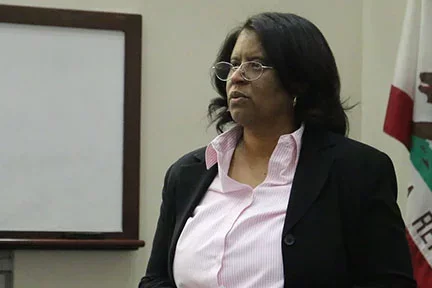
Dr. Daphne Calmes, MD
Executive Director
Urban Health Equity Pathway
Dr. Calmes is the inaugural executive director for the Urban Health Equity Pathway. Shas led the Medical Education Program (MEP) for the past 17 years, as part of her responsibilities in her roles as Associate Dean of Medical Student Affairs for the CDU/UCLA Medical Education Program and Assistant Dean for Student Affairs at the David Geffen School of Medicine. Dr. Calmes’ deep ties to both institutions will help to ensure that the partnership between UCLA and CDU remains as strong and dynamic as ever.
Dr. Calmes received her medical degree from UCLA, and her masters degree in health science from the UCLA School of Public Health. She completed her pediatrics residency and fellowship at King/Drew Medical Center, and her primary care research fellowship at UCLA. Dr. Calmes was appointed to and has held faculty positions at both institutions for over 30 years. Dr. Calmes’ contributions to teaching, administration, student life, and research over the past 30 years are innumerable. She has been a respected member of the leadership teams at both CDU and UCLA, and has personally supported the success of each of the over 800 students who have graduated from the MEP.
In this new role, Dr. Calmes will continue to be a familiar mentor and leadership presence for our remaining MEP students, and will carry the key responsibilities for launching the Urban Health Equity Pathway.
Brendan John, MPA
Administrative Director
Urban Health Equity Pathway
Brendan John, MPA, is the inaugural Administrative Director for the Urban Health Equity Pathway. Brendan has over 20 years of experience working in the health space, as well as over 10 years working in health professions education, with the past 5 years helping to lead the curriculum transformation here at DGSOM.
Brendan has developed and managed several community-based programs focusing on access and equity. He has worked with Federally Qualified Health Centers (FQHCs) and many other community partners on initiatives aimed at enhancing access to care and reducing health disparities in Los Angeles County.
Advisory Committee
Adriana Izquierdo, MD, MSHS
Anne Skinner
Andrea Guevara-Castro (UHEP Cohort Member)
Augustine Bannerman (UHEP Cohort Member)
Daphne Calmes MD, MPH
Deborah Prothrow-Stith, MD
Eraka Bath, MD
Brendan John, MPA
Jason Napolitano, MD,
Jerry Abraham, MD, MPH, CMQ
Keith Norris, MD, PhD
Kristen Schwartz, PhD
Natasha Wheaton, MD
Naomi Castellon-Perez (UHEP Cohort Member)
Roshan Basanti, PhD
Regina Tham (UHEP Cohort Member)
Sharon Younkin, PhD
Redesign & History
The Urban Health Equity Pathway is a new chapter in the over 40-year partnership between the David Geffen School of Medicine at UCLA (DGSOM) and the Charles R. Drew University of Medicine and Science (CDU)! We began this partnership in creating the UCLA/CDU Medical Education Program (MEP) in 1981.
The program develops leaders who advance medical practice and knowledge in under-resourced communities in the United States and abroad.
The program has graduated over 800 physicians to date. In October 2022, CDU received approval to establish the first medical school in South Los Angeles with an inaugural 2027 class.
This planned outcome of the MEP is an achievement that was made possible, in part, by the tremendous success of the CDU/UCLA MEP program. Both CDU and DGSOM have undergone transformative changes over the past 40 years, and realize that we are now in a position to transform what has historically existed as the CDU/UCLA MEP into a new partnership that reflects the evolution of both institutions, as well as the changes in medicine and society. Leadership at both institutions are committed to ensuring the continuation of our valuable collaboration and the success of our new educational partnership. The traditional MEP program will transition with the DGSOM Class of 2027. We will launch the Urban Health Equity Pathway (Pathway) beginning with the class of 2028.